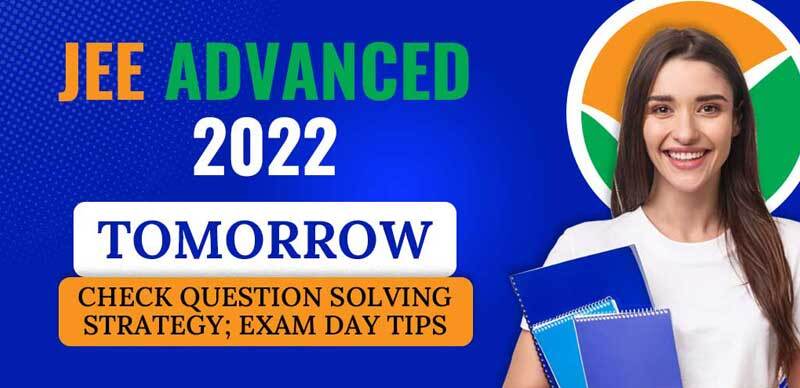JEE Advanced 2022 Tomorrow : Check Question-Solving Strategy; Exam Day Tips

SHARING IS CARING
If our Website helped you a little, then kindly spread our voice using Social Networks. Spread our word to your readers, friends, teachers, students & all those close ones who deserve to know what you know now.
JEE Advanced 2022 Tomorrow : Check Question-Solving Strategy; Exam Day Tips
The Indian Institute of Technology, Bombay (IIT-Bombay) will conduct the JEE Advanced 2022 exam tomorrow, i;e on August 28. It is important that students revise all important topics a day before the exam and have a question-solving strategy ready for the exam day.
To help students prepare well for the exam, here are some expert tips and suggestions for exam day.
EMD-based Strategy : What, Why, and How to use it
EMD (Easy Moderate Difficult) based strategy exploits the difference in the difficulty level of JEE Advanced exam. It is a known fact that all questions are of varying levels of difficulty which can be classified into one of the 3 classes easy, medium, and difficult. In this approach, we make sure that all the easy questions across the three sections are solved first. Only then the moderate ones must be attempted. If there is still time left after doing so, we can try solving the difficult ones.
Why it Works?
The answer to why the EMD-based strategy lies in the inference derived from the data tabulated above. As you can see that over the years easy + moderate questions are nearly 75-80 percent of total marks. Moreover, even the top 100 ranks since 2015 nearly averages the same. So even if a student leaves all the difficult questions and attempts and solves all the easy and moderate ones he/she can end up in the top 100 ranks. Another amusing fact is even if a student only solves all the easy questions and a few moderate ones he/she can get a rank in the proximity of 20 thousand.
How to Apply it?
While the exact application of EMD technique may involve subjectivity, there are few broad guidelines and general themes about how to apply it. To understand this we have to know that the average number of questions asked over the last few years in the paper is nearly 56. The total allotted time is 3 hrs or 180 min. Knowing that 80% of the paper is good enough to get a top 100 rank, roughly 4 min is available for each question.
The objective of EMD technique is to maximise marks per unit time. Hence the classification of questions is based on this parameter. Roughly,
Easy: Required time for solving < 4 min
Medium: Required time for solving > 4 min
Difficult: Required time for solving over 10 min
The goal is to solve all the easy questions of Physics, Chemistry and Maths first. Then move on to the moderate ones. If still some time is available then try solving the difficult questions. However this is rarely possible.
Miscellaneous yet Important
Order of Attempting the subject: Start with Chemistry and try completing it in 30-45 min. Then you may attempt the Physics section and try solving in less than an hour. The time saved in these two subjects can help in Mathematics which is usually lengthy and tedious of the three. This is just a suggestion based on empirical evidence. The students can choose their own but avoid Physics at the end.
Two papers one Exam: The JEE Advanced has 2 papers one in morning and the other in afternoon of 3 hrs each. So the performance in one paper must not affect that in the other. This is relevant to both cases where 1st paper goes well or it goes badly. Both papers should be given with beginner mindset and no emotional correlation
Who is setting the paper & what to expect?: This year IIT Bombay is setting the paper. Before this they did prepare 2015 and 2007 paper. The common theme is the element of surprise, tricky and lengthy solution. For eg in 2015 paper there was no single choice MCQ and heavy negative marking.







 Profile
Profile Signout
Signout
















 Quiz
Quiz
 Get latest Exam Updates
Get latest Exam Updates 










